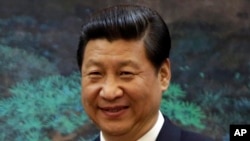President Barack Obama and Chinese President Xi Jinping are expected to discuss how to deal with North Korea’s recent missile and nuclear threats during their meeting this week, officials and experts say.
Xi embarked Tuesday on his first state visit to the United States, which includes an invitation to the White House on Friday.
The meeting comes amid heightened tensions on the Korean Peninsula over North Korea’s threats regarding a long-range rocket launch and nuclear test. The communist country said it planned to launch a “series of satellites” into space and announced that it had started all its nuclear facilities.
“This week’s meeting between President Obama and President Xi will be another opportunity to discuss how we can sharpen Pyongyang’s choices between having nuclear weapons and developing economically,” U.S. national security adviser Susan Rice said at an event in Washington this week.
U.S. officials say both Washington and Beijing are firmly committed to denuclearizing the Korean Peninsula.
Pressure on Pyongyang
“China and the United States are equally united in demanding the complete and verifiable denuclearization of the Korean Peninsula," Rice said. "We firmly oppose North Korea’s efforts to develop nuclear weapons and ballistic missiles that threaten regional stability and our respective national security interests.”
Ben Rhodes, U.S. deputy national security adviser, said Beijing has been showing greater willingness to put pressure on Pyongyang.
“I think we’ve seen in recent years an increasing Chinese willingness to understand that we need to be underscoring the necessity of denuclearization, and as necessary applying pressure on the North Korean regime,” Rhodes said in a press call Tuesday.
Many experts appear to agree that Washington and Beijing share the goal of denuclearization of the Korean Peninsula. But some say there is a difference between the two sides on how to achieve the goal.
David Straub, former director of the State Department’s Korea Desk, said Beijing’s cooperation with Washington on Pyongyang "will remain limited for the foreseeable future" for historical, political and strategic reasons.
Regime collapse
Bruce Klingner, senior analyst at the Heritage Foundation, said Beijing might be reluctant to press Pyongyang hard for fear of a regime collapse in its ally.
“The reality will be that Beijing continues its policy of stronger rhetoric against North Korea, but remains unwilling to implement stronger measures since it is fearful doing so could trigger a crisis on its border," he said. "Beijing will again call for the return to the six-party talks without preconditions, but will not pressure North Korea to abandon its prohibited nuclear and missile programs.”
Straub said he didn't expect the leaders to announce a new measure against Pyongyang.
“The two presidents will have an in-depth discussion about North Korea, and they will reiterate their principal opposition to Pyongyang’s continuing development of nuclear weapons," he said. "However, I don’t expect them to take a new or stronger joint position on that issue.”
Frank Jannuzi, president of the Mansfield Foundation, which promotes U.S.-Asian cooperation, said the summit message would be limited to a call for Pyongyang to “return to the bargaining table and to refrain from any provocative measures.”
Obama is expected to stress Pyongyang’s commitment to denuclearization, and Xi is unlikely to threaten any new actions against Pyongyang, according to Jannuzi.
Joseph DeTrani, former nuclear envoy and intelligence official, said the two leaders are likely to reiterate their previous position that Pyongyang should “recommit to comprehensive and verifiable denuclearization, in return for security assurances and economic and energy assistance.”
DeTrani added that Pyongyang would face additional international sanctions if it conducted a long-range rocket launch or nuclear test.





